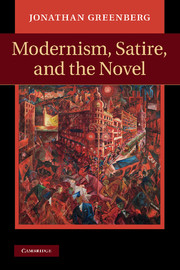Book contents
- Frontmatter
- Contents
- Illustration
- Preface
- Abbreviations
- Chapter 1 Satire and its discontents
- Chapter 2 Modernism's story of feeling
- Chapter 3 The rule of outrage: Evelyn Waugh's Vile Bodies
- Chapter 4 Laughter and fear in A Handful of Dust
- Chapter 5 Cold Comfort Farm and mental life
- Chapter 6 Nathanael West and the mystery of feeling
- Chapter 7 Nightwood and the ends of satire
- Chapter 8 Beckett's authoritarian personalities
- Notes
- Index
Chapter 4 - Laughter and fear in A Handful of Dust
Published online by Cambridge University Press: 07 October 2011
- Frontmatter
- Contents
- Illustration
- Preface
- Abbreviations
- Chapter 1 Satire and its discontents
- Chapter 2 Modernism's story of feeling
- Chapter 3 The rule of outrage: Evelyn Waugh's Vile Bodies
- Chapter 4 Laughter and fear in A Handful of Dust
- Chapter 5 Cold Comfort Farm and mental life
- Chapter 6 Nathanael West and the mystery of feeling
- Chapter 7 Nightwood and the ends of satire
- Chapter 8 Beckett's authoritarian personalities
- Notes
- Index
Summary
In Evelyn Waugh's universe, life is nasty, British, and short. Amid the author's clear-eyed dissection of national patterns of feeling, characters are killed with invention and glee. In his first novel, Decline and Fall, a schoolboy, Lord Tangent, is shot by a stray bullet from a track official's misfired starting gun. In 1932's Black Mischief, the hero unwittingly consumes the stewed body of his lover during an African emperor's funeral rites. In Vile Bodies, as we have seen, a gossip columnist puts his head in an oven when he is banned from the best parties, a prostitute falls drunkenly to her death from a chandelier, and an exhibitionistic socialite dies following an accident suffered in an auto race she enters on a lark. By the time Waugh wrote A Handful of Dust, the seemingly casual acceptance of violent and untimely death had become the signal characteristic of his dark humor.
With an ambivalence characteristic of Waugh's critics, Conor Cruise O'Brien has called this apparent indifference to death a “schoolboy delight in cruelty,” distancing himself morally and emotionally from Waugh's enjoyment while still praising the author's peculiar talents. O'Brien discerns, even as he reproduces, a discrepancy in the fiction between ethics and pleasure, one that maps precisely onto the double movement of satire. And if Waugh's fiction exemplifies the paradoxes of satire, it is equally valuable for the questions it opens in understanding modernism. As seen in Vile Bodies' ambivalent treatment of an anarchic modern world, Waugh's attitudes toward both modernism and modernity are vexed. In George McCartney's words: “Waugh's response to the modern was marked by a certain fruitful ambivalence. In his official pose he was the curmudgeon who despised innovation, but the anarchic artist in him frequently delighted in its formal and thematic possibilities.” In short, although Waugh later in life repeatedly positioned himself as anti-modernist, his early fiction came to embody a modern sensibility in its apparent rejection of the novel's traditional ethical obligations. Hence, in Waugh, the satiric and the modern often look very much alike; while the author may claim to satirize a decadent modernity, the disruptive mechanism of his satire fosters the very modern decadence he decries.
- Type
- Chapter
- Information
- Modernism, Satire and the Novel , pp. 70 - 91Publisher: Cambridge University PressPrint publication year: 2011



